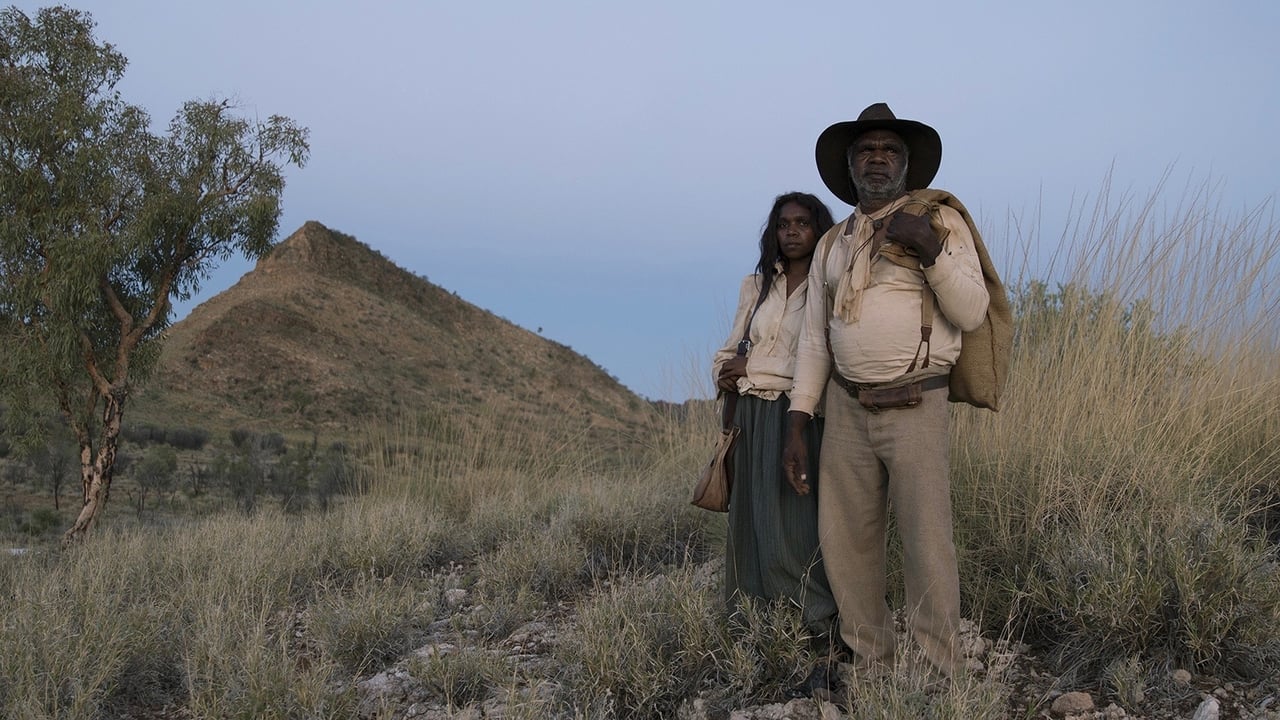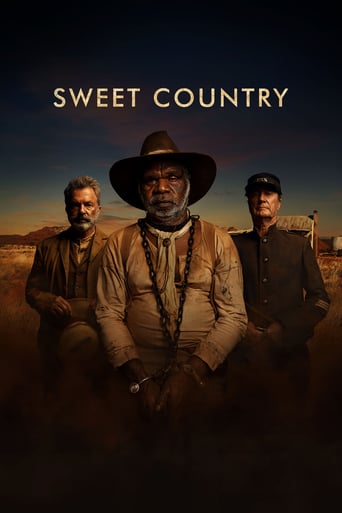



good back-story, and good acting
It's fun, it's light, [but] it has a hard time when its tries to get heavy.
View MoreIf you're interested in the topic at hand, you should just watch it and judge yourself because the reviews have gone very biased by people that didn't even watch it and just hate (or love) the creator. I liked it, it was well written, narrated, and directed and it was about a topic that interests me.
View MoreThe movie really just wants to entertain people.
This movie had me watching until the credits. It made the viewer wonder just how life in Australia could have been different if we knew then, what we know now about how to treat and how we should treat our fellow humans. My only disappointment was the use of an American song to finish the movie. We have such great, true Australian talented artists, why not use one of their songs to bring the movie to an awesome Australian closing. Excellent viewing.
View More'Sweet Country' isn't only great because of its Australian setting and style of cinematography, although long desolate shots of the outback certainly don't do it any harm, shades of classic spaghetti westerns. It actually has a fine story, uplifting and ultimately tragic, and some decent movie action and acting which make it a good film by anybody's standards. So, ignore the negative reviews, if you like films it's time well spent!A couple of 'issues' which to my mind reduce 'Sweet Country's' impact as a dramatic and socially-driven western. I don't think there's enough depth in some of the central characters. The preacher Sam Smith played by Sam Neil could have been brought into the film more, especially with an actor of Neil's quality, and Bryan Brown's portrayal of 'multiple-sided' main sheriff Sergeant Fletcher also felt under-developed if you want to give a more rounded' view of things. On the other hand, Hamilton Morris as the wrongly-accused and hunted aborigine Sam Kelly is outstanding from start to finish. In fact, a lot of the drama among the indigenous actors is powerful and works in favour of the film.The action of 'Sweet Country' unfolds believably for me, but is let down at the end with the trial. You can't really pack a punch in a justice movie unless you show how the verdict is reached effectively ('To Kill A Mockingbird' etc.). So, in this case, tag an extra 20 minutes or so on the film to emphasize the evidence (with say repeat 'flashbacks' of the crime) as well as the eye-witness accounts. I won't spoil this with details, just fair to say I found the film a bit thin at the end.So, 'Sweet Country' does enough to earn its awards and accolades, a credit to those involved in making it. All the other stuff ... a study of racism, accurate or otherwise views of history, powerful socio-political statement ... all open to discussion, as it should be. Enjoyable, a 'must-see' sort of film.
View MoreThe Australian western is a genre all its own and Sweet Country is the finest example of its type. Warwick Thornton's direction and the cinematography (credited to Dylan Rivers and Thornton) are outstanding, as are all of the lead acting performances. The influence of John Ford can be seen in the foregrounded figures silhouetted in doorways against the harsh sunlit landscape but this is a country all its own. Shot in both Central and South Australia, the sweeping outback landscapes rival anything shot in a Monument Valley western. The Western genre may have originated in America but here it transcends those origins to tell us a quintessentially Australian story. And it's a bloody, brutal, and tragic one. Hamilton Morris plays Sam Kelly, an Aboriginal man charged with murdering a white man, who goes on the run from the authorities. The fact that his name is Kelly and that one of the white character is a Fitzpatrick (one of Ned Kelly's adversaries) seems hardly coincidental. When the locals gather in the street for a screening of The Story of the Kelly Gang (1906), Sergeant Fletcher (Bryan Brown) puts an end to the proceedings, angered that they can enjoy a film that glorifies an outlaw. The casting of Brown as Fletcher is perfect and his experience on the hunt for the fugitive Kelly is a highlight of the film. When he recites the Anzac pledge 'we will remember them' over the body of the sadistic rapist Harry March a chilling comment on Australian nationalism is made. The white man's rituals must trample over the black man's rituals. Never mind his brutality, March was an Anzac and is eulogised as such while the constant dehumanising of the Indigenous characters in the film offers not the slightest degree of respect or even basic decency. The exception is the missionary Fred Smith (Sam Neil), for once a minister who is portrayed not as a figure of ridicule or a symbol of colonisation but as a very human and compassionate figure. His rendition of 'Jesus Loves Me' during the hunt for Kelly is the only light moment in an otherwise bleak and harrowing tale of dispossession, hatred, and violence. The Aboriginal people living on the traditional lands into which Kelly and the search party must go are a threat both to the white men and to those Aborigines who have lost touch with their traditional way of life. These are no cliched 'noble savages' either as they are also capable of rape and murder. Matt Day as Judge Taylor tries to bring white man's law to bear on the situation and, though sympathetic, shows little understanding of the cultural gap involved in putting Indigenous people who have lost touch with their own ceremonies into the dock and compelling them to answer questions from a person invested with the authority of the crown. With little understanding of either 'lore' or 'law' such witnesses can offer little even in their own defence. Unsurprisingly, the film has a tragic ending and the Rev Smith's final question 'what hope does this country have?' is one we still find ourselves asking a century later.
View MoreGreetings again from the darkness. For whatever reason, Australia and Westerns seem to go together quite well. Perhaps it's the naturally beautiful vistas that seem to stretch forever. Maybe it's the slower pace and the accent that provide the perfect blend of comfort and danger. What matters is that director Warwick Thornton has delivered another gem from the Outback genre.That previously mentioned blend of slow pace and danger is evident in the opening scene. Fred Smith (Sam Neil) is napping in a rocking chair on his front porch until being startled awake by the snorting of a stranger's horse only a few feet away. The Harry March (played by Ewen Leslie) is an ornery war vet who drinks too much and is racist to his core. The film is set in the 1920's, although it doesn't really matter when. It's more about the what, the why and the who. The racism on display would be just as believable in contemporary times, though this Outback seems very far out. Neighbors are rarely seen, and the town is so small, they watch movies and hold court outside on the dusty main street.Co-writers Steven McGregor and David Tranter have created a story that likely has played out in real life, although hopefully not to this extreme. A series of events: indigenous Australian Sam Kelly (played exceptionally well by non-actor Hamilton Morris) is coerced into helping March put up a fence, March crosses the line with Sam's wife, a young boy Philomac (played by twins Tremayne and Trevon Doolan) is always stirring up trouble and pilfering things. A drunk March accuses Sam of hiding the boy and violence erupts leaving the "white fella" dead and Sam and his wife on the run.Sergeant Fletcher (Bryan Brown) is the local law - he even proclaims "I am the law" - and he forms a posse to track down Sam so he can stand trial. The posse includes March's friend Kennedy (Thomas M Wright), Sam's employer Fred Smith (Mr. Neil), and Archie (Gibson John), an indigenous Aussie employed by Kennedy. Director Thornton uses this chase sequence to paint some extraordinary visions on screen. The natural land is beautiful, and then we come across a stunning and deadly desert in the salt flats. Mr. Thornton acts as co-cinematographer with Dylan River, and the result is a movie that's a thing of beauty to look at. Director Thornton uses an array of flashbacks and flash-forwards, sometimes in quick cut form. This approach keeps us on our toes, sometimes foreshadowing, sometimes filling gaps. Against the wishes of the locals, this is a developing country, and many of the locals feel it's no longer their country - they are kept as laborers, and rarely treated as equals by the new inhabitants. In this world, for this man (Sam), doing the right and necessary thing places he and his family in instant peril. It's better to run than surrender. The story is very good, though the dialogue is a bit lacking at times. The photography is world class. Though we would have preferred screen vets Bryan Brown and Sam Neil to have more scenes together, the panoramic majesty of Australia is certainly enough ... with an added and fitting bonus of Johnny Cash singing "Peace in the Valley" over the closing credits.
View More